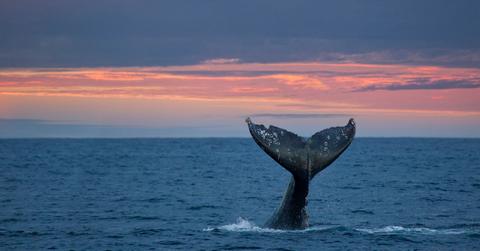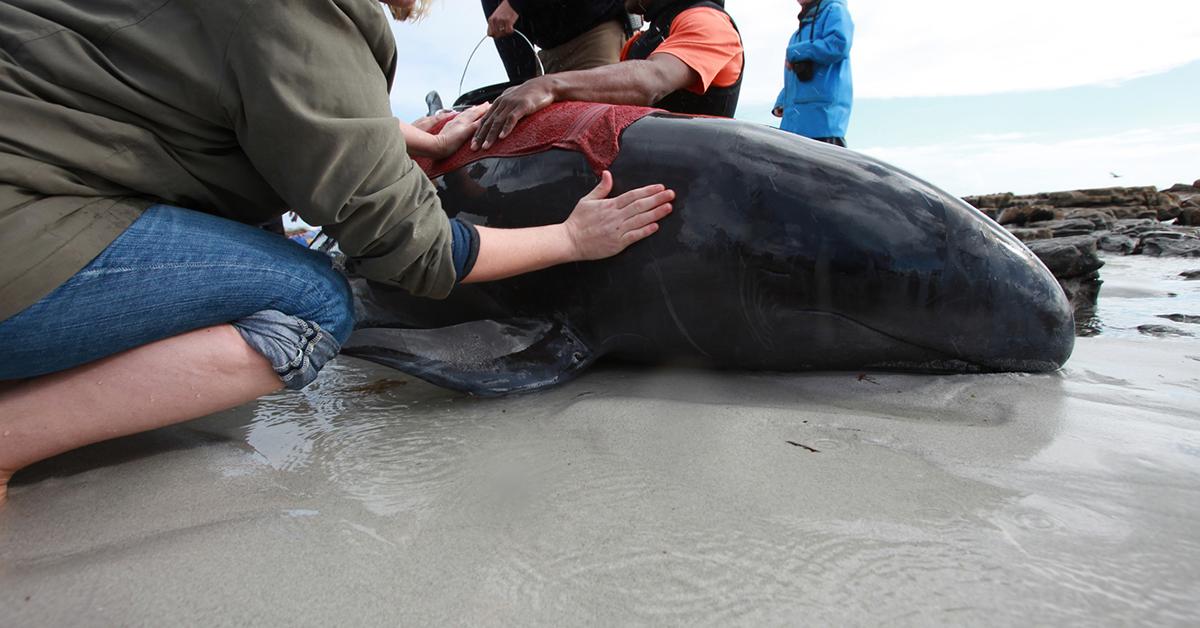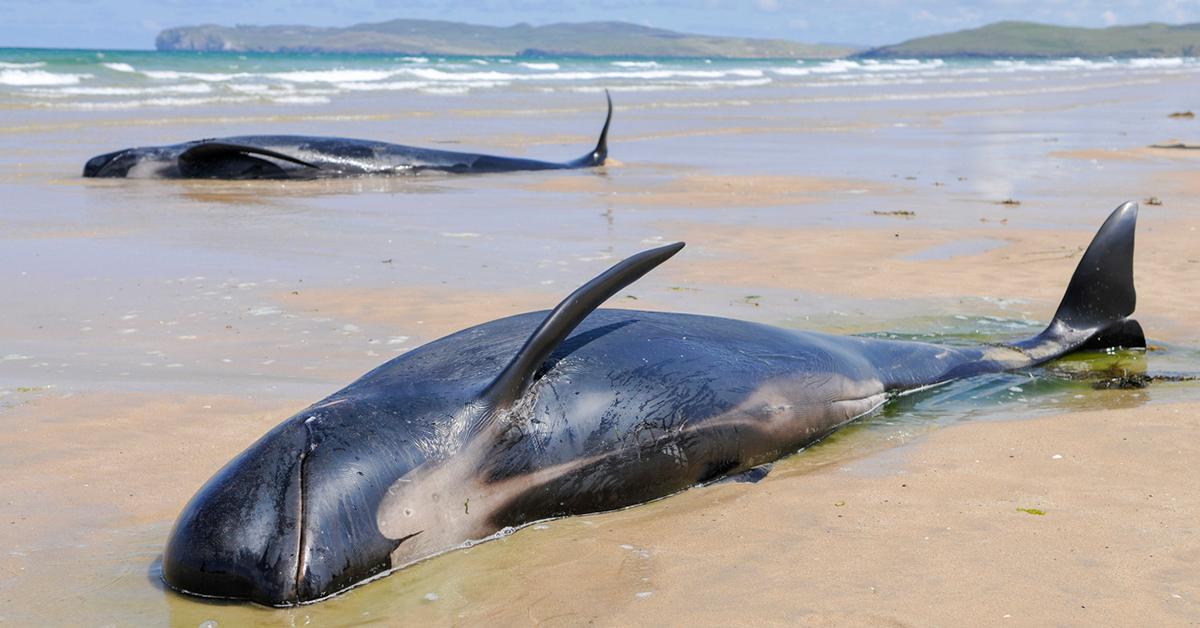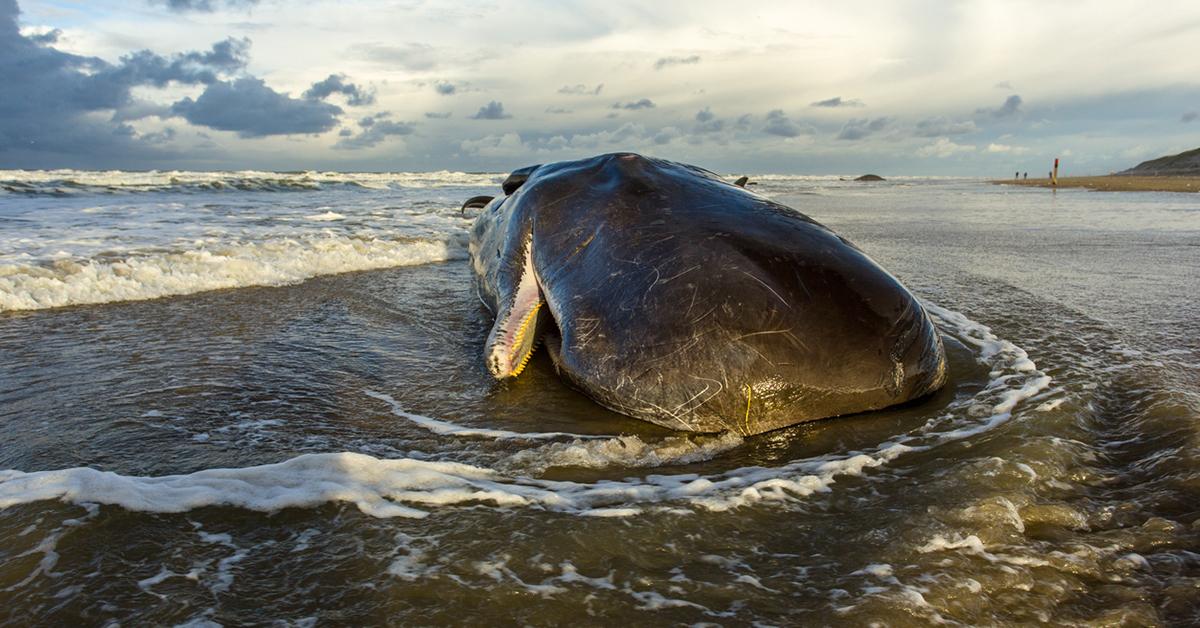Why Do Whales Beach? A Deep-Dive Into What Causes Whales to Strand Themselves on Shore
Even though it's been studied for years, humans still don't fully understand.
Updated June 22 2020, 1:22 p.m. ET

Why do whales beach? It’s one of the more puzzling phenomena in nature that though humans may study, we still do not understand entirely. We do know that whales can become beached if they wade into too shallow water or if they are sick and can no longer swim. In this case, an exhausted whale won’t be able to continue swimming and then will eventually wash ashore.
But we also know that whales are extremely family-oriented, which could be one of the reasons why mass beachings happen, too. The Atlantic reports that in 2018, more than 150 pilot whales washed up on an Australian beach for seemingly no reason. There, the pod died in mass quantities, as the solid surface of land cannot support a whale’s chest walls. Their internal organs became compressed and, eventually, most of the whales stopped breathing.
Whale beaching is hardly a problem unique to Australia or to the year 2018. Mass quantities of whales have been recorded beaching in New Zealand, Cape Cod, and Chile. In Cape Cod, Mass., as many as 226 whales and dolphins beach or become stranded there each year. In 2019, a long-reported humpback whale — named Vector by researchers — beached in Cape Cod for seemingly no reason. She had five documented calves and had been spotted near the area as far back as 1984. Since 2016, the National Oceanic and Atmospheric Administration has reported the deaths of at least 14 humpback whales in Massachusetts.
According to The Atlantic, the largest mass whale beaching recorded in history occurred when 1,000 whales beached at the Chatham Islands of New Zealand over a century ago. And it’s still an issue — a mostly misunderstood issue — today.
So, why does it happen? Why does it happen to lone whales and why does it happen to entire groups of whales all at once? Keep reading for more information on why whales beach themselves.
What is whale beaching?

Whale beaching is a colloquial term for what is scientifically known as cetacean stranding. It is a phenomenon in which both whales and dolphins strand themselves on land. (Considering the land closest to most waterways is typically a beach, the stranding usually happens on a beach.)
Beaching is a suicide of sorts, especially when it happens in mass quantities. Sometimes entire whale pods strand themselves on land, gasping for air and laying there to die for hours. If beached whales are discovered, humans can attempt to return some of the whales to the ocean and prolong their lives by drenching them with water until an attempt to return them can be made.
Sadly, most beached whales and dolphins end up dying. This can be due to dehydration or the result of their internal organs being crushed while on land. When high tide comes in, the whale could actually drown once water covers their blowhole.
Whale beaching is not a new phenomenon. Records of cetacean stranding go back as far as a century ago, but we also know that they happened long before then, as well.
Why do whales beach themselves?

Humans’ understanding of whale beaching as a phenomenon is still relatively unknown. Sometimes, a lone whale will beach by accident; maybe he has swum into water that is too shallow and can no longer swim. Eventually, he’ll wash ashore.
If a whale becomes sick, she might also become too tired to swim. Again, she will eventually wash ashore from exhaustion and an inability to swim.
But mass strandings are also a somewhat common behavior in whale and dolphin populations and those are even more puzzling.
Scientists and researchers have proposed that changes in water temperature could be a cause of beachings, which means that whale beaching could be directly correlated to climate change and global warming. Other causes proposed include irregularities in whales’ echolocation and geomagnetic disturbances, but neither have been proven to the point of full clarity. In fact, the easiest reasons to accept why whales beach themselves are accidents: inclement weather, difficulty giving birth, hunting in too-shallow waters, and mistakes made in navigating. Bigger whales may also strand because they are closely following larger dolphins or porpoises into shallow waters; while the dolphins may be able to escape the coastal waters, larger whales may become trapped and therefore, beach.
Most whales are also extremely family oriented. They live in large pods from the moment they’re born and typically live in that same pod, never leaving their mothers for life. One hypothesis behind the cause of mass strandings is this strong family bond. If one whale becomes sick, lost, old, or confused, the other whales in the pod might just follow suit. After all, they do everything together. It could result in the pod tragically dying together, as a unit.
How do whales get beached?
Whales get beached when they either swim in too-shallow, coastal waters and can’t get out or if they become too sick, old, or tired to swim. In the latter case, whales will stop swimming and therefore, eventually wash ashore. These are the main reasons for whale beaching that humans can make sense of, though there are many other proposed reasons that have still not been confirmed.
Whale beaching causes:
The most commonly accepted reasons that whales beach include getting trapped in too-shallow, coastal waters or a sick, disoriented, old, or confused whale who gets too close to shore.
However, these could not possibly account for all of the reasons why whales beach, especially whales that beach in mass quantities. Some other causes of whale beaching are thought to include:
- Changes in water temperature
- Irregularities in whales’ echolocation
- Geomagnetic disturbances
- Errors made in navigation
- Hunting too close to shore
- Sonar interference
- Inclement weather
Some whale beaching is actually intentional as it can be a hunting tactic. Killer whales have been known to intentionally beach, then lunge at seals. But this usually doesn’t result in a be-all-end-all beaching; it appears that orcas have mastered this hunting technique and have learned how to ride the waves back into the sea. Researchers surmise that this hunting behavior has been passed down between generations of orca whales.
One particularly disturbing cause of whale beaching is human interference. Some evidence shows that a particular species — known as beaked whales — change their diving behavior and surface too quickly when they encounter navy sonar. Surfacing too quickly can result in bubbles forming in their blood, joints, and vital organs, rendering them vulnerable to beaching.
Do beached whales survive?

Sadly, beached whales seldom survive. Even if they are saved and returned to the water — which is very difficult to do — these rescued whales will usually re-strand. It’s not entirely understood why, but it could be because the whale beached for a specific reason: either that he was sick, tired, confused, or could not swim.
Do beached whales explode?
One of the reasons beached whales become a concern to human life is that they actually pose a threat. Beached whales can, and sometimes do, explode due to a buildup of gas that can happen as the beached whale decomposes.
The reasons why whales and dolphins beach are certainly a concern for humans, but another part of the problem is the discarding of the whale. Since it can pose a threat and explode while it decomposes, beached whales must be taken care of quickly.
In the past, dynamite has been used to blow up the decaying carcass of a whale, giving a whole other meaning to the question, “Do beached whales explode?” The thought process behind this was that blowing up the carcass would result in pieces of the blubber small enough for other scavengers to eat and dispose of naturally. However, the exploding whale of Florence, Ore. in 1970 proved the disposal process to be less than satisfactory. The Oregon Highway Division blew up a beached sperm whale using dynamite, causing whale flesh to fly down from the sky as far away as 800 feet from the scene. Some whale flesh even hit a parked car.
Do beached whales make noise?
Whales are able to make noise when out of the water, though it would be a much softer sound than if it were made underwater. Beached whales can produce sound in air versus water, but it would be a very frail, fragile sound that would not travel very far. Furthermore, any other whales or mammals still in the water would not be able to hear the sounds of beached whales.